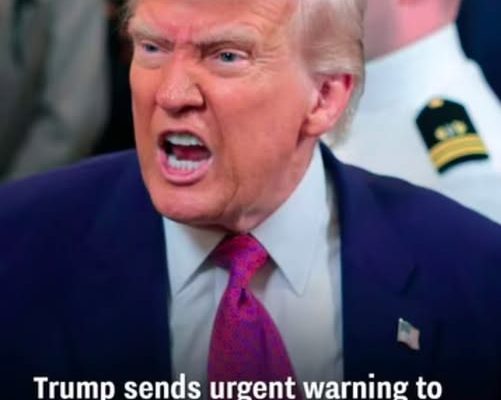Urgent warning

Tensions Flare Again After Ceasefire After announcing a ceasefire agreement between Israel and Iran, U.S. President Donald Trump issued a firm warning to Israel, urging it not to retaliate in response to reports of renewed hostilities.
Earlier this week, President Trump shared a hopeful message on his platform Truth Social, stating that both Israel and Iran had agreed to end what he referred to as “The 12 Day War.” He praised both nations for showing “stamina, courage, and intelligence” and expressed optimism about the region’s future.
“Israel and Iran came to me, almost simultaneously, and said, ‘Peace!’” Trump wrote. “I knew the time was now. The World, and the Middle East, are the real winners. Both Nations will see tremendous love, peace, and prosperity in their futures.”
However, within hours of the announcement, allegations surfaced that Iran had violated the ceasefire agreement by launching missiles at Israel—claims that Iranian state media have firmly denied.
In response to the uncertainty, Trump issued a new message addressed directly to Israel, urging restraint amid the escalating rhetoric. “ISRAEL. DO NOT DROP THOSE BOMBS. IF YOU DO IT IS A MAJOR VIOLATION. BRING YOUR PILOTS HOME, NOW!” he posted on Truth Social.
Despite Trump’s message, Israeli officials voiced serious concerns. Prime Minister Benjamin Netanyahu stated that Israel would respond strongly to any breach of the ceasefire. Defense Minister Israel Katz echoed the sentiment, saying he had instructed the Israel Defense Forces to prepare for “intense strikes” targeting government facilities in Tehran, should further violations occur.
Although reports indicated that Iran may have launched two missiles, Israeli defense systems reportedly intercepted them before they caused damage. As of now, no casualties or infrastructure losses have been confirmed.
The situation remains tense, with both nations exchanging strong words but refraining—for now—from full-scale escalation. International observers continue to monitor the region closely, hoping that diplomatic efforts can hold and prevent further violence.
😱😱30 minutes ago in New York…See more
😱😱30 minutes ago in New York…See more
😱😱30 minutes ago in New York…See more

Trump Speaks After U.S. Bombs Key Iran Nuclear Sites
The U.S. has entered Israel’s war against Iran, attacking three nuclear sites. In an address from the White House, President Trump said the objective of the attacks “was the destruction of Iran’s nuclear enrichment capacity” and warned of more strikes “if peace does not come quickly.”
Pentagon officials said on Sunday that three of Iran’s nuclear sites sustained “severe damage” from the U.S. strikes overnight that have prompted a furious response from Tehran and spurred fears of more dangerous escalations across the Middle East.
President Trump said the U.S. military joined Israel’s war against Iran to destroy Iran’s nuclear enrichment capacity and claimed success, saying that three nuclear facilities had been “completely and totally obliterated.” The full extent of the damage to the sites was not immediately clear, and top Pentagon officials later said that it was too soon to say whether Iran still retains some nuclear ability.
“Iran, the bully of the Middle East, must now make peace,” Mr. Trump said in a brief, televised address from the White House. “If they do not, future attacks will be far greater and a lot easier.”
Iranian officials said they were working to assess the scale of the damage to facilities at Fordo, Natanz and Isfahan from the strikes that hit early Sunday local time. In a news conference on Sunday morning, the chairman of the Joint Chiefs of Staff, Gen. Dan Caine, said that the initial battle damage assessment indicated that all three sites had sustained “severe damage and destruction” and that a final assessment would take time. A senior U.S. official acknowledged that the attack on the Fordo site did not destroy the heavily fortified facility, but severely damaged it.
Mr. Trump’s decision to attack Iran was likely to dim hopes for a negotiated solution to end the fighting, just days after the president had indicated he would wait for as long as two weeks to give diplomacy a chance. After the U.S. strikes, Iran’s foreign minister, Abbas Araghchi, lashed out at the United States for undercutting recent diplomatic efforts — and rejected calls by European leaders to return to the negotiating table.
He told a news conference in Istanbul that Iran “reserves all options to defend its security interests and people,” but declined to be more specific — including about whether Iran would retaliate against U.S. military bases in the Middle East.
“We have to respond based on our legitimate right of self-defense,” he told reporters, adding that “there are a variety of options available to us.”
The U.S. strikes ushered in a period of high alert in the region, where more than 40,000 American troops are on bases and warships, as the Pentagon braced for retaliation. While U.S. officials say that Iran has depleted its stockpile of medium-range missiles, the country still has an ample supply of other weapons, including rockets and drones.
Hours after the American attack, which included cruise missiles and more than a dozen 30,000-pound bombs, Iran launched a new round of missiles toward Israel. The Israeli authorities said that at least 16 people were wounded in the barrage, one of many exchanges of fire between the two sides since Israel’s military launched a surprise assault on Iran on June 13.
Prime Minister Benjamin Netanyahu said early Sunday that the U.S. strikes had been carried out “in full coordination” between the American and Israeli militaries.







